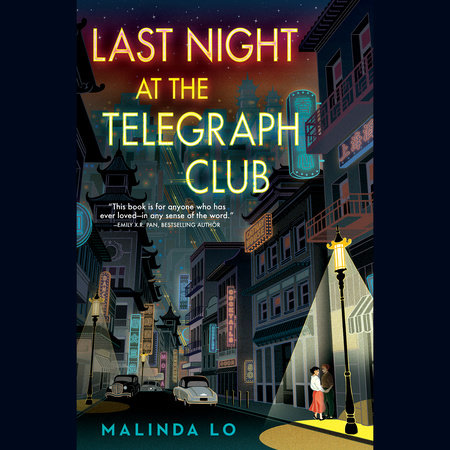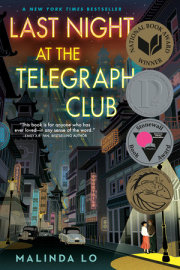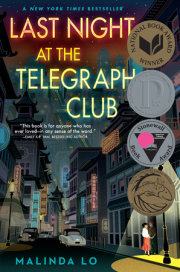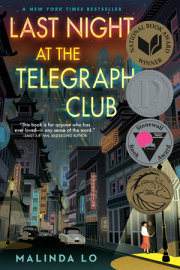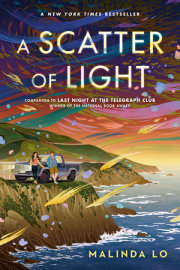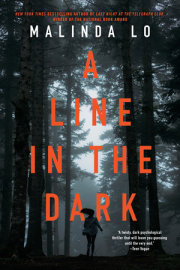The first time Lily had gone to Thrifty had been sometime last year. She had ducked in to buy a box of Kotex, because she hadn’t wanted to get them at the pharmacy in Chinatown, where she’d risk running into people she knew. Thrifty was just outside the neighborhood, so her friends didn’t usually go there. She had soon discovered that Thrifty had another advantage over the Chinatown pharmacy: it had a very good selection of paperback novels. There were several rotating racks of them in a sheltered alcove beyond the sanitary napkin aisle. One was full of thrillers with lurid covers depicting scantily clad women in the embrace of swarthy men. Lily normally bypassed that rack but today she paused, drawn in byThe Castle of Blood, on which the blonde’s red gown seemed about to slip off her substantial bosom, nipples straining against the thin fabric.
The book rack alcove was normally deserted, but even so, Lily spun the rack self-consciously, retreating behind it so that she was hidden from view. The women on these book covers seemed to have a lot of trouble keeping their clothes on. The men loomed behind them or clutched them in muscular arms, bending the women’s bodies backward so that their breasts pointed up.
There was something disturbing about the illustrations—and it wasn’t the leering men. It was the women’s pliant bodies, their bare legs and lush breasts, mouths like shiny red candies. One of the books had two women on the cover, a blonde and a brunette. The blonde wore a pink negligee and knelt on the ground, eyes cast down demurely while the shapely brunette lurked behind her. The title wasStrange Season, and the tagline read, “She couldn’t escape the unnatural desires of her heart.”
An electric thrill went through Lily. She glanced around the edge of the book rack, sharply conscious that she was still in public, but although she could hear the ringing of the cash register at the front of the store, she didn’t see anyone approaching her corner. She went back to the book, opening it carefully so that she didn’t crease the spine, and began to read. The book was about two women in New York City: a young and inexperienced blonde, Patrice; and an older brunette, Maxine. When Patrice was jilted by her boyfriend in public, Maxine took pity on her and helped her get home. Thus began their somewhat confusing relationship, which veered from Maxine setting up Patrice with new men, to strangely suggestive conversations between the two women.
About halfway through the book, things took a turn. Patrice arrived unexpectedly at Maxine’s Fifth Avenue penthouse, distraught after a bad date, and Maxine began to comfort her.
“Why do I want to kiss you?” Patrice whispered as Maxine stroked her long blond hair.
Maxine’s fingers jerked, but then she resumed the rhythmic petting. “I don’t know, Patty, why do you?”
Patrice twisted around on the couch, rising to her knees. “Max, I’d rather be here with you than on any date!”
Lily turned the page, her heart racing, and she could barely believe what she read next.
Maxine pushed Patrice back against the velvet cushions, lowering her mouth to the girl’s creamy skin. “You’re like me, Patrice. Stop fighting the possibility.” Patrice whimpered as Maxine pressed her lips to her neck.
“Max, what are you doing?” Patrice gasped. “This is shameful.”
“You know what I’m doing,” Maxine whispered. She unbuttoned Patrice’s blouse and slid the fabric over Patrice’s shoulder, stroking her breasts. Patrice let out a sigh of pure pleasure.
“Kiss me now,” Patrice whispered.
Maxine obeyed, and the sensation of Patrice’s mouth against hers was a delight far beyond shame.
Lily heard the creak of wheels rolling in her direction, and she quickly peeked around the book rack, her skin flushed. A clerk was pushing a metal cart stacked with boxes of Kleenex past the shelves of Modess and Kotex. She hurriedly closed the book and stuffed it into the rack behind the novelFramed in Guilt. She sidled over to the next rack—science fiction—and pretended to peruse the books.
Her position enabled her to keep an eye on the clerk, who was restocking the shelves at the end of the aisle. She itched to return toStrange Season, but she didn’t dare read it while the clerk was so nearby—and she could never, ever buy it. The clerk was moving so slowly she felt as if she might jump out of her skin.Usually the science fiction rack was her favorite, but today her eyes skipped over the cover illustrations of planets and rocket ships without registering them. She couldn’t stop imagining Patrice and Maxine on that couch together. She wanted to know—sheneeded to know—what happened next, but as the minutes ticked past, she realized she wouldn’t find out today. She had to go get Frankie from school. She cast one last look at the rack that heldStrange Season, and left.
Copyright © 2021 by Malinda Lo. All rights reserved. No part of this excerpt may be reproduced or reprinted without permission in writing from the publisher.

